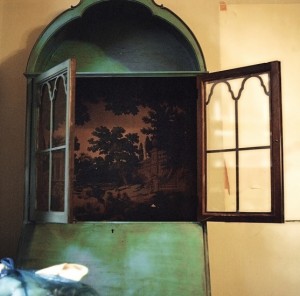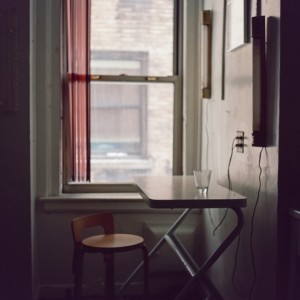 A small sensation has swept San Francisco this week, surrounding a show of photographs by the artist Varese Layzer. On June 21st, the exhibit, entitled “Making Room,” was put up for display at Ritual Coffee Roasters in San Francisco’s Mission district, under a contract that promised a display of “at least six weeks.” By June 27th, the artist’s statement was taken down, the volunteer curator fired, and the artist asked to remove the work as soon as possible. An email from Ritual’s owner, Eileen Hassi, explained to Varese that, while she personally respects the work, the exhibit was “too serious for the cafe” because “It’s dealing with real stuff, real emotions, loss, attachment, family, death…” The entire email can be read here.
A small sensation has swept San Francisco this week, surrounding a show of photographs by the artist Varese Layzer. On June 21st, the exhibit, entitled “Making Room,” was put up for display at Ritual Coffee Roasters in San Francisco’s Mission district, under a contract that promised a display of “at least six weeks.” By June 27th, the artist’s statement was taken down, the volunteer curator fired, and the artist asked to remove the work as soon as possible. An email from Ritual’s owner, Eileen Hassi, explained to Varese that, while she personally respects the work, the exhibit was “too serious for the cafe” because “It’s dealing with real stuff, real emotions, loss, attachment, family, death…” The entire email can be read here.
“It’s dealing with real stuff, real emotions, loss, attachment, family, death”
The artist’s statement, which begins “In 2010, my mother died…” describes the experience documented in the photographs. After her mother’s death, Varese was left to clear out the apartment, the same one that she’d grown up in, to purge thousands of pounds of belongings, and to select just a few that she could make room to keep for herself. For three months, she lived in the apartment and documented the process of “work and grief.”
“Apartment 5E has since been bought and its walls demolished by a new owner. The objects and these pictures are all that remains.”
The images alone are entirely inoffensive, rather unlikely to evoke strong emotions beyond an appreciation for the artwork. They depict common pieces of furniture, the bare walls of an empty apartment, crates and suitcases. The spaces and objects in the images call to memory experiences we’ve had of moving, of leaving behind something that once meant something to us, of closing a door, turning a page in our history. When coupled with the artist’s statement, the exhibit becomes much more powerful, as we can suddenly see her grieving process in the images of bare walls and sparsely-furnished rooms. We can feel in the artwork the difficulty of the process that Varese had to endure as the only surviving member of her family, saying farewell to her family’s home, to her mother, to her past.
In an email to blogger and photographer Thomas Hawk, in an almost-desperate tone shortly after receiving Hassi’s email, Varese explained her plight, closing simply with, “I’m not sure what to do.” She would like to offer to display the exhibit without the statement, which she thinks makes the work “totally harmless” to most people, but Hassi has not been in contact but to request that the artwork be removed by Thursday [July 7th] to make room for another show, and has yet to respond to any requests for comment from writers and publications interested in Varese’s case.
 Varese’s choice to document the process through these everyday objects and images touches on the complicated relationship we have with death, dying, and grief. The simplicity of the images places death and grieving as basic parts of life, while the emotion behind the artist’s statement and the personal memories evoked by the images remind us of the deep impact death and loss can have on our lives.
Varese’s choice to document the process through these everyday objects and images touches on the complicated relationship we have with death, dying, and grief. The simplicity of the images places death and grieving as basic parts of life, while the emotion behind the artist’s statement and the personal memories evoked by the images remind us of the deep impact death and loss can have on our lives.
In her statement to SevenPonds, Varese explained that, while Making Room captures a huge part of her life throughout the grieving process, “there is so much more”. Her own personal development has been driven by the letters she’s received from people in response to the artwork. “I am a person first and an artist second. These letters have been very moving and more satisfying than any critical response could ever be.”
Ritual’s decision to remove the artwork is a telling example of the tendency in our culture to avoid the conversation around death, dying, loss, and grief.
Is this subject really “too serious” for a cafe? Do patrons prefer “stuff that doesn’t make people think about the tough questions in life”– and why? The artist created a touching memorial after the death of her mother, a creative meditation on her grieving experience, and a beautiful collection of photographs. As Varese told SevenPonds, she believes that most people her age in San Francisco have hardly experienced death or loss, and “are mostly mortified to have to hear anything about it and don’t even know how to say ‘I’m sorry for your loss’.”
If patrons wandering in for a few hours with locally-roasted coffee and their MacBooks are faced with the subject of death through this exhibit, perhaps Varese has contributed to a positive step forward in our culture. We at SevenPonds see a world where everyone can experience death in their own way and feel it’s all okay, and an open conversation and cultural attitude surrounding death are essential to facilitating a healthy end-of-life experience, and grieving and healing process.
“People’s discomfort with the honest, difficult events of the lifecycle dictates most things they do! Including taking down art statements.” -Varese Layzer
The framed 20 X 20 prints are available for sale by the artist. The collection and the artist’s statement can be viewed here.
Sources
Thomas Hawk’s Digital Connection

 Art Displaying Grief “too serious” for SF Cafe
Art Displaying Grief “too serious” for SF Cafe


 First the Wealth Gap, Now the U.S. Has a Growing Health Gap
First the Wealth Gap, Now the U.S. Has a Growing Health Gap
 How to Comfort A Dying Loved One
How to Comfort A Dying Loved One
 Our Annual Seven Holiday Gifts for Someone Who Is Grieving, 2024 Edition
Our Annual Seven Holiday Gifts for Someone Who Is Grieving, 2024 Edition














